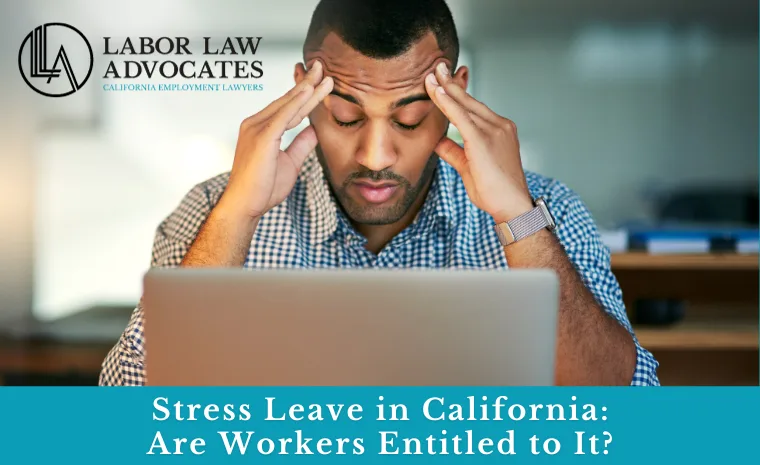In the fast-paced landscape of the modern workplace, the mental health issues of employees have become increasingly prominent. The state of California, known for its robust employment laws, recognizes the importance of safeguarding the mental health of its workforce, and as individuals navigate the challenges of their professional lives, the question of whether workers are entitled to stress leave has gained significant attention.
Work-related stress is an undeniable mental condition for many employees, manifesting in various forms such as burnout, anxiety, and depression. According to recent workplace stress statistics, a substantial number of California workers report experiencing high levels of stress due to factors like heavy workloads, long hours, and challenging interpersonal dynamics. The American Institute of Stress estimates that 83% of workers in the US experience chronic stress, and 25% of them consider their job the #1 stressor in their lives. This costs businesses around 51 billion dollars annually due to absenteeism, and a further 26 billion in mental health costs.
As employers and employees alike deal with the implications of stress in the workplace, it becomes crucial to understand the legal provisions in place to address these challenges. This article will discuss the intricacies of stress leave in California, exploring the rights and entitlements of workers facing the impact of workplace stress, and shedding light on the legal avenues available to ensure their well-being is prioritized. In particular, we will discuss:
- Addressing and recognizing workplace stress
- Legal resources for a California stress leave
- Navigating workplace stress
- Stressful work situations and how to address them
Addressing and Recognizing Workplace Stress
Workplace stress has evolved from being a discretionary concern to a critical priority for both employers and employees in California. The repercussions of unmanaged stress not only affect individual well-being but also have far-reaching consequences on organizational productivity, employee morale, and overall workplace dynamics.
Workplace stress is a multifaceted phenomenon, encompassing factors such as high job demands, lack of control, insufficient support systems, and conflicts with colleagues or superiors. The American Psychological Association defines stress as a reaction to a situation where an individual feels threatened or anxious, with the body responding through a “fight or flight” mechanism. The recognition of extreme stress-related conditions is pivotal in comprehending the impact on individuals and the workplace at large.
Stress-related conditions manifest in various forms, including but not limited to burnout, anxiety disorders, and depression. Burnout, characterized by chronic workplace stress that has not been successfully managed, can lead to emotional exhaustion, reduced performance, and a sense of detachment from one’s responsibilities and personal life. Anxiety disorders, prevalent in high-pressure work environments, can significantly impair an individual’s ability to function effectively. Depression, often linked to prolonged exposure to stress, it’s a psychiatric disorder that can result in a range of symptoms affecting mood, cognition, and physical health.
The acknowledgment of stress-related conditions is a fundamental step in fostering a workplace culture that prioritizes mental health. By recognizing the signs and symptoms, employers can implement proactive measures to mitigate stressors, promote a healthier work-life balance, and provide necessary support systems for better job satisfaction. In doing so, organizations not only contribute to the overall well-being of their workforce but also cultivate an environment conducive to sustained productivity and employee satisfaction.
Legal Resources for California Stress Leave
In California, employees facing work-related stress may be eligible for job-protected leave under the California Fair Employment and Housing Act (FEHA), which plays a role in addressing workplace stress. FEHA prohibits discrimination and harassment based on various protected characteristics, including physical and mental disabilities. Stress-related conditions that qualify as disabilities under FEHA may entitle employees to reasonable accommodations and protection against discrimination. Here’s how to go on stress leave from work in California through FEHA:
- Recognizing Stress as a Disability: If an employee’s stress is severe and disabling, it may qualify as a mental health disability under FEHA. Mental health disabilities are afforded the same protections as physical disabilities under the law.
- Reasonable Accommodations: FEHA mandates that employers provide reasonable accommodations to qualified employees with disabilities. If an employee’s stress substantially limits their ability to perform essential job functions, they may be entitled to accommodations. These accommodations could include modifications to work hours, duties, or the work environment to alleviate stressors.
- Interactive Process: When an employee requests accommodations for stress-related issues, the employer is required to engage in an interactive process to determine appropriate accommodations. This involves open communication between the employer and employee to identify effective solutions that address the employee’s needs while considering the operational requirements of the business.
- Medical Certification: Employers may request medical documentation supporting the need for accommodations or leave. This documentation typically comes from a qualified healthcare professional and outlines the nature of the condition, its impact on the employee’s ability to work, and any recommended accommodations.
- Job-Protected Leave: In addition to accommodations, employees may be eligible for job-protected leave under the Family and Medical Leave Act (FMLA) or the California Family Rights Act (CFRA) for serious health conditions, which may include severe stress. These acts provide eligible employees with the right to take unpaid leave for medical reasons, with job protection upon their return.
Additionally, California provides State Disability Insurance (SDI), which may offer partial wage replacement benefits to employees unable to work due to a non-work-related illness, injury, or pregnancy-related condition, including stress-related conditions.
It’s important to note that the specifics of each case can vary, and eligibility for stress leave or accommodations depends on factors such as the severity of the stress, the impact on job performance, and the documentation provided. Employees facing stress-related challenges should consider consulting with their employer’s HR department and, if necessary, seek legal advice to better understand their rights and options under FEHA.
Navigating Workplace Stress
Empowering employees to navigate workplace stress involves a combination of understanding their rights, effective communication with employers, and seeking appropriate support. Here are some tips for employees facing stress in the workplace:
Know Your Rights
Familiarize yourself with relevant employment laws and company policies related to stress leave, accommodations for disabilities, and workplace rights. This knowledge will empower you to make informed decisions and advocate for yourself effectively.
Open and Honest Communication
Establish open communication channels with your supervisor or HR department. If you’re experiencing stress, discuss your concerns early on to prevent the situation from escalating. Be specific about the stressors you’re facing and how they impact your work
Request Reasonable Accommodations
If your stress is related to a medical condition, consider discussing reasonable accommodations with your employer. This could involve adjustments to your work schedule, responsibilities, or environment to better support your well-being.
Document Your Situation
Keep a record of incidents contributing to your stress, including dates, times, and descriptions of specific events. This documentation can serve as evidence if you need to demonstrate the severity and persistence of the stressors to your employer or, if necessary, in legal proceedings.
Explore Supportive Resources
Seek guidance from employee assistance programs (EAPs), if available, or mental health professionals. EAPs often provide counseling services and resources to help employees cope with stress. Confidentiality is a key aspect of many of these programs.
Utilize Company Policies
Be aware of any company policies related to stress management, mental health, or employee well-being. Some companies have specific programs or resources in place to assist employees facing stress.
Engage in Self-Care
Prioritize self-care to manage and alleviate stress. This can include taking breaks, maintaining a healthy work-life balance, and engaging in activities that promote mental and emotional well-being.
Seek Legal Advice When Necessary
If your attempts to address workplace stress are not successful, and you believe your rights are being violated, consider consulting with an employment attorney. They can provide guidance on your specific situation and potential courses of action.
Collaborate with Colleagues
Discuss your concerns with trusted colleagues or supervisors who may offer support or share their own coping strategies. Collaboration can foster a supportive work environment.
Follow Up on Agreed Upon Changes
If you and your employer agree on changes to alleviate stress, ensure these adjustments are implemented and assess their effectiveness. Regularly communicate with your employer about your well-being and any ongoing challenges.
Remember, each workplace situation is unique, and these tips serve as general guidance. If your stress persists or escalates, seeking professional advice from legal or mental health professionals is recommended.

Stressful Work Situations and How to Address Them
Here are a few hypothetical scenarios that could potentially lead an employee in California to consider seeking stress leave:
- Excessive Workload: Sarah, a marketing manager, consistently faces an unmanageable workload due to understaffing in her department. Despite her efforts, the workload continues to increase, leading to prolonged periods of high stress and impacting her overall well-being.
- Workplace Bullying: Alex, an IT specialist, experiences persistent bullying from a colleague. The hostile work environment creates significant stress, affecting Alex’s mental health and job performance. Despite reporting the issue to HR, the bullying persists, prompting Alex to consider stress leave.
- Inadequate Workplace Support: Emily, a project manager, faces a challenging project with tight deadlines and high expectations. Despite expressing the need for additional resources and support, her requests are consistently overlooked. The lack of support intensifies her stress levels, prompting her to explore stress leave options.
- Personal Health Crisis: James, a sales representative, is dealing with a severe personal health crisis. The stress from managing his health concerns, coupled with the demands of his job, becomes overwhelming. James finds it increasingly difficult to balance his health needs and work responsibilities.
- Discrimination and Harassment: Maria, an executive assistant, experiences discrimination and harassment based on her gender identity. The hostile work environment takes a toll on her mental health, causing increased anxiety and stress. Despite attempts to address the issue internally, the situation persists, leading Maria to consider stress leave.
- Job Insecurity: Chris, a software developer, works for a company undergoing financial instability and constant restructuring. The uncertainty surrounding the future of the company and potential layoffs creates a constant state of stress, impacting Chris’s ability to focus on work tasks and maintain a healthy work-life balance.
- Lack of Flexibility: Taylor, a single parent, faces challenges in balancing work and family responsibilities. Despite requesting a more flexible work schedule to accommodate childcare needs, the employer denies the request, contributing to heightened stress levels as Taylor struggles to meet both personal and professional demands.
If you are currently going through a similar situation as these hypothetical examples, you may be entitled to seek a stress leave through FEHA. However, if your employer denies you a stress-related leave in California, there are several legal steps you can consider taking to protect your rights and seek resolution.
Keep in mind that employment laws can be complex, and it’s advisable to consult with an employment law attorney for advice tailored to your specific situation. Here are general steps you might consider:
Document Everything
Keep a record of all relevant communications, including your request for stress-related leave, any denials, and reasons provided by your employer. Document incidents or circumstances contributing to your stress, as well as any medical documentation or notes from healthcare professionals supporting the need for leave.
Communicate Clearly
Engage in open and honest communication with your employer. Request a meeting with your supervisor or HR representative to discuss the denial and express your concerns. Clearly communicate the impact of your stress on your ability to perform your job and the reasons you believe leave is necessary.
Review Company Policies
Refer to your company’s policies on leave and accommodations. Ensure that you understand the procedures and requirements outlined in these policies. Your employer may have internal procedures for addressing disputes or appeals.
File a Complaint with the DFEH
If you believe your employer’s denial violates California employment laws, you can file a complaint with the Department of Fair Employment and Housing. The DFEH investigates claims of discrimination, harassment, and failure to provide reasonable accommodations.
Seek Legal Advice
Consult with an employment lawyer to discuss the specifics of your case. An attorney can provide guidance on your rights, potential legal claims, and the best course of action. They may also assist in negotiating with your employer or pursuing legal action if necessary.
Consider Legal Action
If informal resolution attempts are unsuccessful, you may have the option to pursue legal action. This could involve filing a lawsuit against your employer for violation of employment laws. Your attorney can guide you through this process.
Your Mental Health Always Matters
In short, the legal intricacies surrounding stress-related leave in California emphasize the significance of a well-informed and proactive approach for both employers and employees. The California Fair Employment and Housing Act plays a crucial role in safeguarding the rights of individuals facing stress-related challenges in the workplace. By recognizing stress as a potential disability and emphasizing reasonable accommodations, workplaces in California promote not only legal compliance but a culture of empathy and support.
Employees facing denials of stress-related leave, however, can navigate this complex terrain by documenting their experiences, understanding company policies, and engaging in transparent communication with their employers. Seeking legal advice becomes a strategic step in this process, guiding individuals through potential disputes and ensuring adherence to the legal avenues available under FEHA.
As California’s workforce continues to evolve, the intersection of legal frameworks and mental health considerations is a dynamic space. The commitment to creating workplaces that prioritize employee well-being is not merely a legal obligation but a strategic investment in a resilient and thriving professional community, fostering an environment where individuals can address stress-related challenges with confidence, knowing that their rights are respected, and their well-being is prioritized.




